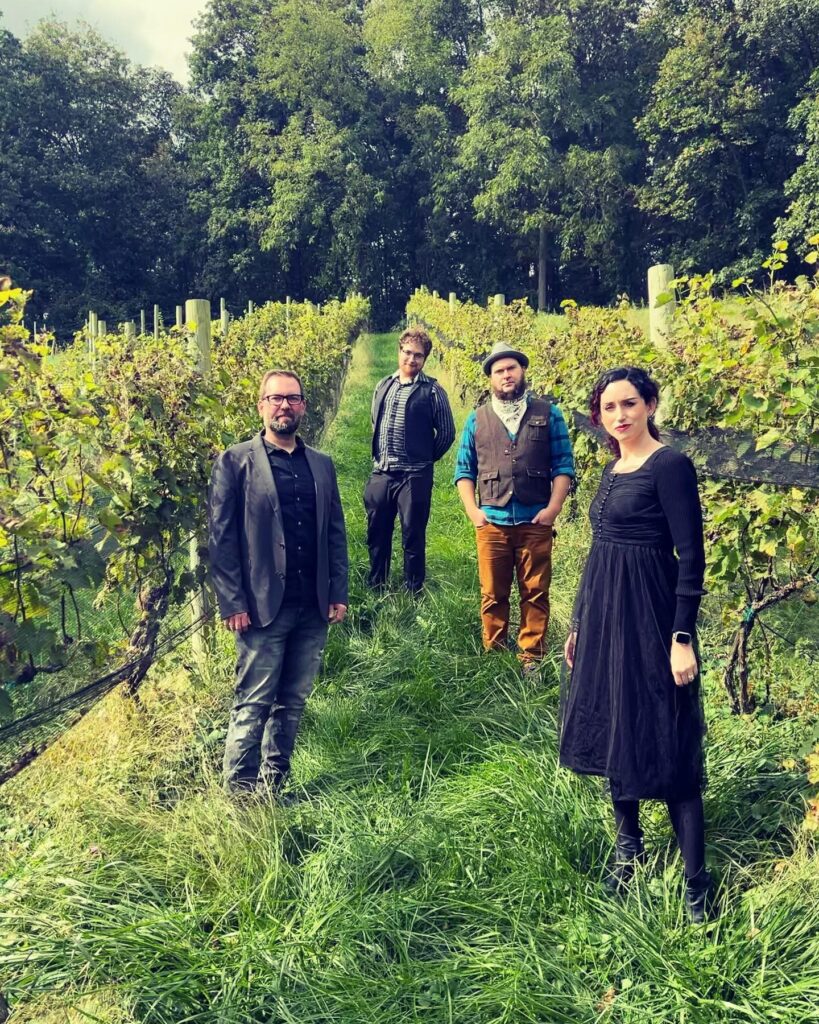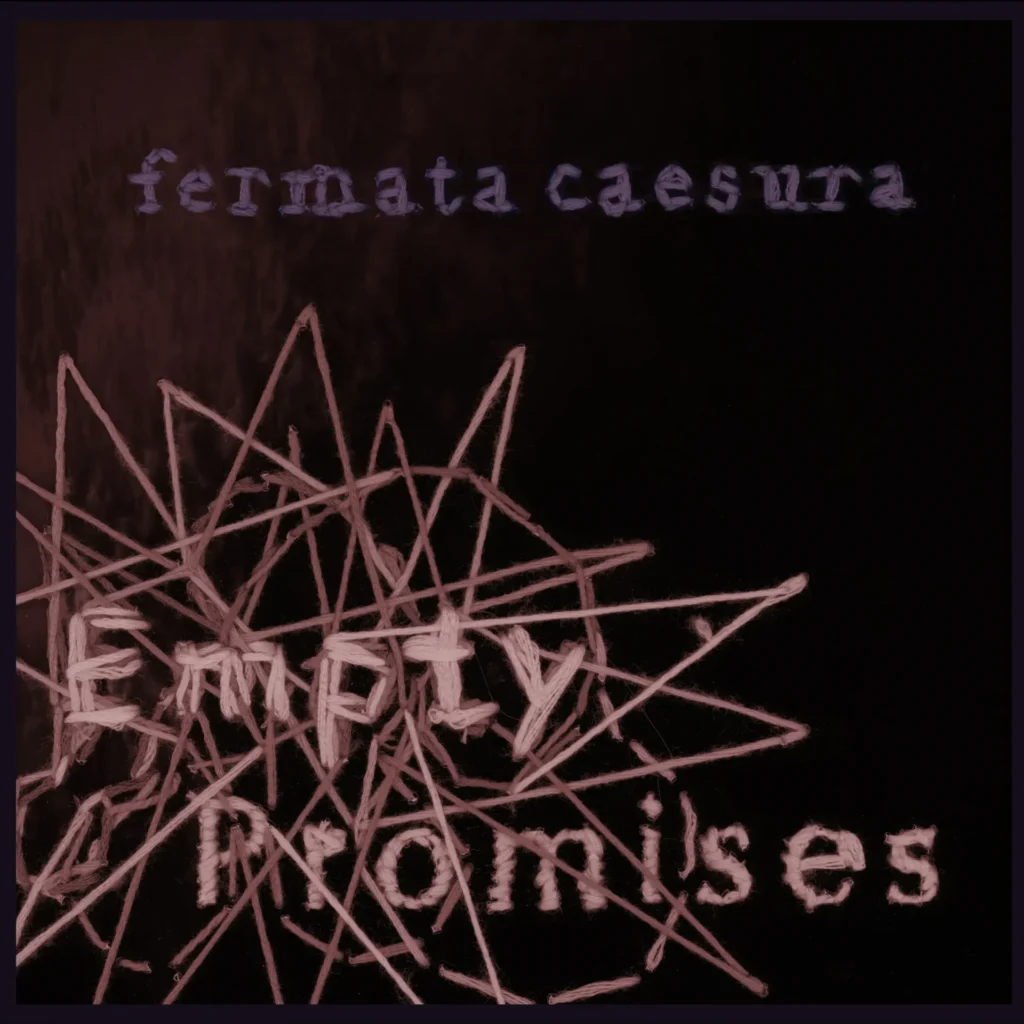Fermata Caesura is a chamber folk group whose cinematic soundscapes captivate with the intimate passion of a string quartet and ignite with the audacious bravado of a rock band. New single Empty Promises depicts the collapse of a relationship like a fever dream. It poses the question, “Are we ever greater than when we began?” with the knowledge that the answer is no.
Fermata Caesura create a rich auditory texture that reflects the whole peaks and valleys of human existence. Lisa (vocals), Cody (upright bass), Eli (guitar), and Thillman (cello) from Wisconsin’s Fermata Caesura met through an ad Eli posted on Craigslist, where he miraculously found his musical soulmates. A shared admiration for artists such as Edgar Allan Poe, John Denver, Fleetwood Mac, Radiohead, Bon Iver, Iron and Wine, and The Civil Wars inspired the quartet to pursue their musical dream of combining poetry with classical string instruments and rock music, and to “take listeners on a musical journey while demonstrating that they are not alone in a life that can at times appear bleak and full of loss.”
Fermata Caesura are the smoldering embers that explode into flames to repel the ever coming darkness. Check out their song Empty Promises and the exclusive interview below:

1. Can you tell us a bit about where you come from and how it all got started?
FERMATA CAESURA: Lisa: We are from the US. Eli and I were both living in the Midwest in Madison, Wisconsin when the band was originally formed. Eli had put out an add on a popular wanted ads site looking for musicians with a similar vision as his. I had gotten on the site to place my own add and stumbled upon his inquiry. When reading what he was trying to accomplish with music it was as if I had written it. It was exactly what I was looking for. Eventually life led Eli to the East Coast and we disbanded for about a decade. Right before the pandemic Eli and I had been reconnected through a fan who was in search of a physical copy of our first album. We got to talking about how through technology we could work with each other again from afar. Our previous bass player also jumped on board and Eli introduced us to our cellist, Thillman, who had been working with Eli separately for about 5 years. Our situation is unique but then everything about us tends to lean that way.
2. Did you have any formal training or are you self-taught?
FERMATA CAESURA: Each of us has varying levels of formal training, blended with self-taught skills. Though rooted in classical training we love to bend genres and infuse those rock influences.
3. Who were your first and strongest musical influences and why the name ‘FERMATA CAESURA’?
FERMATA CAESURA: Eli here. I grew up on John Denver and punk rock as well as the works of Edgar Allan Poe, Tolkien and William Faulkner. I would say they all impacted how I write, what I write and to an extent, my approach on the guitar.
The name Fermata Caesura works for us, because it combines words that are used in music as well as poetry. They are both words that have a little bit of an air of mystery to them as well.
4. What do you feel are the key elements in your music that should resonate with listeners, and how would you personally describe your sound?
FERMATA CAESURA: We hope people connect with the lyrics and the passion that goes into creating little sonic worlds that the listener can get lost in. We would describe the sound as cinematic chamber folk/rock.

5. For most artists, originality is first preceded by a phase of learning and, often, emulating others. What was this like for you? How would you describe your own development as an artist and music maker, and the transition towards your own style, which is known as FOLK?
FERMATA CAESURA:
Eli here. Early in my guitar playing and songwriting life, I would listen to artists and bands that I liked and say to myself, “I’m never gonna be able to do that. I’m not good enough.” So, instead of trying to emulate them, because I believed I couldn’t, I attempted to develop my own techniques and set of skills, and then bolstered and enhanced it with some formal music theory training. If I couldn’t play or sound as “good” as the artist or band I was currently into, then I could at least sound different.
Lisa-
For me I was a teen when grunge hit. I was listening to bands like Smashing Pumpkins and Veruca Salt all while being classically trained as a vocalist. I knew I wanted to do something different as an artist and I knew I wanted to hear classical instruments in rock music. I loved when artists would break down heavier songs and do them acoustically. . So I set out to create just that, an acoustic rock sound with classical elements. I think we do a good job of learning from each other as a band and leveraging each others strengths and influences to create something truly unique.
Thillman-
I spent about 10 years studying cello classically, but classical music was rarely being played when I was growing up. By the time I graduated college I realized that I didn’t have a healthy relationship with music. It wasn’t fun and I always really admired artists that played classical instruments in different genres- Rasputina, 2 cellos, Yo-Yo Ma, and Punch Brothers to name a few. I’ve spent the past 10 years finding that joy in music that I knew was there. Fermata Caesura has been a big part of that and allows me to explore all types of genre bending.
6. What’s your view on the role and function of music as political, cultural, spiritual, and/or social vehicles – and do you try and affront any of these themes in your work, or are you purely interested in music as an expression of technical artistry, personal narrative, and entertainment?
FERMATA CAESURA:
One of the wonderful aspects of music is that it can be any or a combination of those things. Each song is different and each artist can lean into any number of these elements. I have written a few political songs, but our music tends to lean more towards combining a personal, or universal narrative that is enhanced by the technical artistry.
7. Creative work in a studio or home environment, or interaction with a live audience? Which of these two options excites you most, and why?
FERMATA CAESURA: Lisa here: That’s a tough question. We really love both but I know for me recording in the studio gives me a euphoric feeling. I love creating and putting in the time to make a song truly come to life. We talk a lot as a band about what we are leaving behind and the studio is where we get to truly make our mark on something that will out live us.
Thillman here: I think all of us will agree on the studio. Personally I love coming in with a fully realized part, recording it, and then collaborating with everyone else there to make my ideas more comprehensive to serve the song, and tell the story within the notes. It is such a magical and creative space that I can stay in for hours. That said, there is NOTHING like the adrenaline rush of an electrifying live performance. I know Eli loves the studio because no matter what happens with the music you make, you still have the real, “solid” evidence that you made it. No one and nothing can take that away.
8. Could you describe your creative processes? How do usually start, and go about shaping ideas into a completed song? Do you usually start with a tune, a beat, or a narrative in your head? And do you collaborate with others in this process?
FERMATA CAESURA:
Eli here. The songwriting process is all over the map for me. Its changed as years have gone by and I have gathered other tools and techniques for crafting songs. Sometimes a life event impacts me and something comes out from those emotions. Sometimes its memories, or something I hear in passing. Other times, I will ask my bandmates, Thillman and Lisa, for prompts and those can spark an idea.
Thillman here: Since we live so far apart we have a fun and tricky process on how a song gets created. It always starts with the melody and guitar line sent from Eli. Lisa will then take the melody line and make it her own. After that I hunker down to see what I can do musically to reflect or enhance the words being sung, and we all put our heads together to figure out how to further tell the story insrumentally. Eli is a wellspring of ideas. We send rough home drafts to each other all the time, which culminates in scheduling recording sessions at typically two different studios.
9. What has been the most difficult thing you’ve had to endure in your life or music career so far?
FERMATA CAESURA:
Loss is a prevailing theme in our music and each of us has felt it through some combination of the loss of a relationship, a pet, or a family member and these chapters of life have all impacted the music in some way.
10. Do you think is it important for fans of your music to understand the real story and message driving each of your songs, or do you think everyone should be free to interpret your songs in their own personal way?
FERMATA CAESURA:
We feel that if its important to a listener to know the real story behind a song, we are more than happy to oblige, but we don’t usually disclose that information without someone directly asking. What it means to us shouldn’t have an impact on what it means to the listener. They bring all their own life experiences into the song and it becomes theirs. We don’t want to get in the way of that unless the listener has a strong desire to know.
KEEP IN TOUCH:
FACEBOOK | INSTAGRAM | SPOTIFY | WEBSITE

